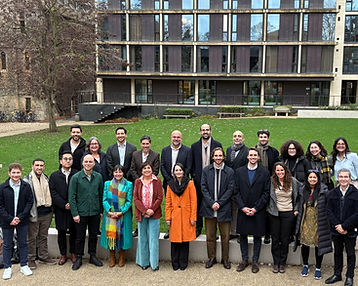
Winter School Bioeconomy
January 14-17, 2026
Kassel, Germany
From 14 to 17 January, the Winter School Bioeconomy took place at the University of Kassel under the motto ‘Shaping structural change in Hesse together’. The event aimed to develop new socio-ecological perspectives for the future of North Hesse by closely interlinking theory and practice.

New Publication: Regional capabilities in the European automotive industry
December 17, 2025
Online
Tim Becker and Dr. Sebastian Losacker, together with Prof. Margherita Russo, have published their new article "Regional capabilities in the European automotive industry: Relatedness, complexity and lock-ins in the transition to electric vehicles" in the journal Progress in Economic Geography.

Workshop „Green Windows of Opportunity: Which ones are still open?“
December 8, 2025
Oxford, England
On 8 December 2025, Tim Becker participated in a full-day workshop at the University of Oxford together with scientists and practitioners from around the world. The workshop focused on the question of which Green Windows of Opportunity remain open for so-called “latecomer economies” and what conditions must be met to successfully exploit them.

Editorial: Innovation, Sustainability Transitions, and the Bioeconomy
December 6, 2025
online
Dr. Sebastian Losacker, together with Prof. Teis Hansen and Prof. Daniel Schiller, has published a new editorial entitled “Exploring the geography of innovation and sustainability transitions in the bioeconomy.”

Research stay at the Joint Research Centre
October 20 - November 14, 2025
Seville, Spain
From mid-October to mid-November 2025, Tim Becker completed a one-month research stay at the Joint Research Centre (JRC) of the European Commission in Seville. The JRC serves as the scientific service of the European Commission, providing independent, evidence-based research to support European policy-making

4th ISTARI.AI Research Partner Workshop
November 12, 2025
Mannheim, Germany
On November 12, 2025, Moritz Schütz took part in the 4th ISTARI.AI Research Partner Workshop in Mannheim. The event brought together researchers from across Europe to discuss recent developments and research findings in the field of WebAI.

Bioeconomy and AI
November 10th, 2025
Berlin, Germany
Dr. Sebastian Losacker took part in an event organized by the Federal Ministry for Research, Technology and Space (BMFTR) on November 10, 2025, in Berlin. The event, titled “Artificial Intelligence as a Catalyst for the Bioeconomy,” explored the potential of this key technology for a bio-based economy from various perspectives.






